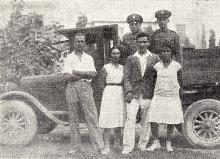| Activity during the early years |
The Hagana was founded by men such as: Eliyahu Golomb, Hashomer member Haim Sturman and Shaul Me'erov Avigur, who recognized the vital need for the establishment of an independent Jewish Defense force. Self Defense organizations such as (Bar-Giora) and Hashomer were already established in the past, however Hagana founders envisioned a national popular organization differing from Hashomer that operated as a small independent guard force. Up until 1930 the Central National Hagana committee functioned as the supreme commanding body, and was led by Yosef Hecht. The committee was in charge of fund raising, weapon purchasing and distribution amongst the settlements. During those years the Histadrut Ha'ovdim (Federation of Labor) funded the Hagana, and among other activities initiated 2 officer training courses. The first one was named cynically by veteran Shomrim the "Comedianchikim" (the Comedians) battalion and the other the Italian Battalion (volunteer Battalion founded in Italy to join the Palmach). The National Hagana Defense committee collaborated with the independent Local Defense committees who purchased their own weapons, funded their commander's salary and trained their own members. During the Arab Riots of 1929, the Hagana proved its importance by repulsing most of the Arab attacks. Organizational changes had to be made accordingly, and the organization was suborned to National Institutions and became a non political organization. National Command was established and included representatives from all walks of life in the Yishuv- from both urban districts and rural branch headquarters. Some of the headquarters included professional units functioning as consultants in various areas, including medical services, wireless communications, and intelligence, and eventually district and area commands appointed professional and experienced military men to be in charge of the different departments. District commands evolved gradually into a professional military H.Q. in charge of weapons procurement and manufacturing, and finally the establishment of a special technical department for the sole purpose of technical and fortifications planning. In addition, the National Command initiated officers training courses, and established an intelligence network. In 1938 area commands united into regional districts (Sharon, Samaria, and Amaqim. North & South) and joined the 3 urban districts (Jerusalem, Tel-Aviv & Haifa). National Command, led by Yohanan Ratner included medical services, wireless signals communication and a training bureau, and was subordinate to the Jewish Agency. In 1939 a General Staff was established, subordinate to the National Command. Ya'acov Dostrowsky- Dori was appointed as Chief of Staff. Apart for the 2 years during which Yitzhak Sade served as Deputy Chief of Staff, Ya'acov Dori served as the head of the Hagana until the Hagana turned into the IDF, when he was then appointed as the first Chief of Staff of the IDF. The country was divided once more into commands (north, middle, south and Jerusalem) and districts (Tel-Aviv & Haifa), and plans for defending the Yishuv were made accordingly, providing Hish (Field Combat Corps) and Chim (Home Guard) for their defense. Attempts were made to create a national mobile force attached to the General Staff. Similar attempts were made in the past with the establishment of Fosh (Combat Field Company) in 1937-1939, Pum (Special Operations), Hish and & Chim. Field Corps members were honest, hard working citizens. They trained several hours a week and during weekends, and participated in short intensive courses, but were not fully enlisted. The Palmach (Mobile Striking Force) and the Gadna (Youth battalions) were both established in 1941. Palmach was the first enlisted mobile force, and the Gadna trained youths that studied and worked at the same time. Many highly motivated and well trained Gadna members enlisted with the Hagana and the Field Corps. The Hagana defended the Yishuv until 1948 and joined the Palmach military force that fought the War of Independence against the Arab armies until it became the IDF, the facilitator of Israel's independence. | |||||||||




